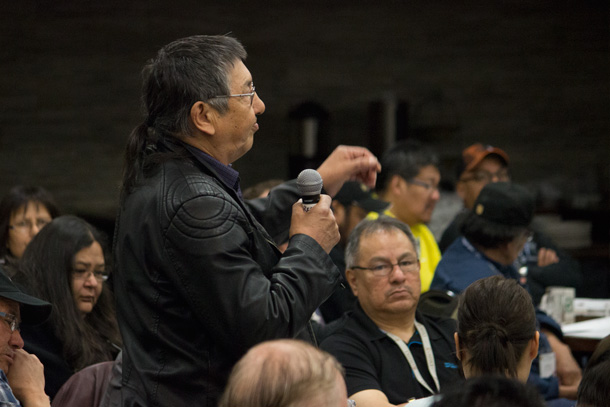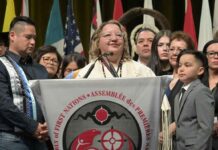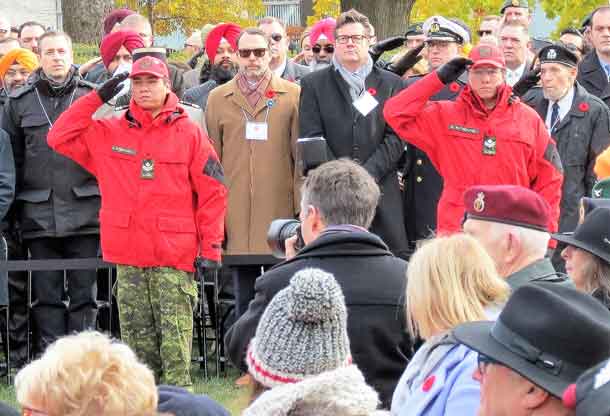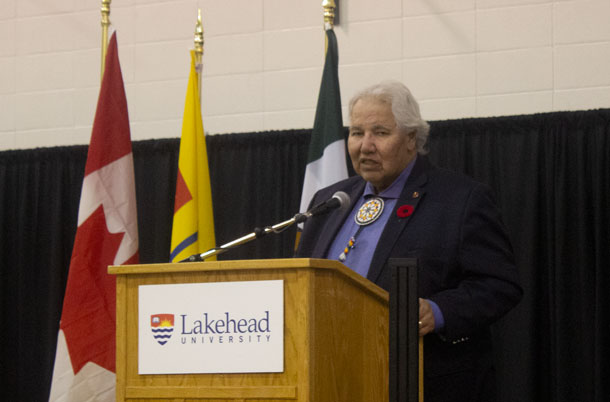
CONFEDERACY OF NATIONS MEET IN HISTORICAL GATHERING
THUNDER BAY – This week the Assembly of First Nations (AFN) Confederacy of Nations met to discuss the contentious issue of Bill C-33, and to ensure that the voice of the First Nations across Canada was being reflected in the decisions being made by the Assembly of First Nations.
These discussions led to a unanimous rejection of the federal education bill in a meeting that brought together leaders from across Canada.
The Assembly of First Nations Confederacy of Nations, the governing body between the assemblies of the Chiefs provided with strong oversight powers, concluded a full agenda of discussion which led to a resolution that rejected Bill C-33. The Confederacy also assumed full control of all matters relating to education and Bill C-33 and will report to the Special Chiefs Assembly on May 27.
“This historic meeting of the Confederacy of Nations sees our leaders from across the country come together in unity to discuss the federal education bill, and as anticipated it was unanimously rejected,” said Chief Isadore Day of Serpent River First Nation who moved the motion to initiate the Confederacy. “This historical meeting of our leaders is necessary and aims at unifying on a single cause and are providing direction on the future of the education of our children and the future of our nations.”
“We have invoked AFN Charter provisions that give the First Nations across this country a say about matters of great importance. Up to this point, the Minister of Aboriginal Affairs and the National Chief’s office have unilaterally pushed Bill C-33. Where the executive has not been able to stand prudent on behalf of First Nations, the Confederacy reps will assert and stand firm,” said Chief Day.
Minister of Indian Affairs and Northern Development Canada Bernard Valcourt responded to a valid question posed by NDP MP Jean Crowder Thursday regarding a motion passed at the recently duly convened meeting of the Confederacy of Nations by stating that members of the House should “condemn, in the strongest terms, the threats of those rogue chiefs who are threatening the security of Canadians, their families and taxpayers.” The Minister then went on to say that the Chiefs gathered were not concerned about the education of their children and future generations nor were they the “good, hardworking Chiefs.”
Chief Gordon Beardy of Muskrat Dam who seconded the Confederacy motion called the comments ill-informed and disappointing.
“Valcourt’s slanderous accusations are founded on rumours and innuendo. The historic resurrection of the Confederacy of Nations that took place was a legitimate representative gathering of First Nation leaders from across the country as mandated in the Charter of the Assembly of First Nations,” Chief Beardy said. “The representative delegates of the Confederacy agreed to not only reject Bill C-33 but to form a committee to enter into discussions with the Minister on a viable alternative to the Bill. There was no statement, letter, motion or resolution from the Confederacy threatening any of our Treaty partners in Canada. Quite frankly we are very disappointed that the Minister would take his talking points from rumours spread by media who were not even present at the meeting.”
“He has branded himself a rogue Minister. You cannot reason with him. All he wants to do is push his legislation through and not listen to the majority of the First Nations who have been rejecting it from day one,” Beardy said.
The meeting was co-chaired by AFN Regional Chief for Quebec-Labrador Ghislain Picard, the official spokesperson for the AFN Executive Committee. Since the resignation of National Chief Shawn Atleo, the AFN Executive Committee has assumed the role and function of the National Chief pursuant to the Charter. Wally McKay of Manitoba was appointed co-chair.
There were over 50 delegates representing seven regions present, constituting a quorum for the convening of the Confederacy meeting.
The Confederacy resolved to establish a coordinating committee of Chiefs, one fro





